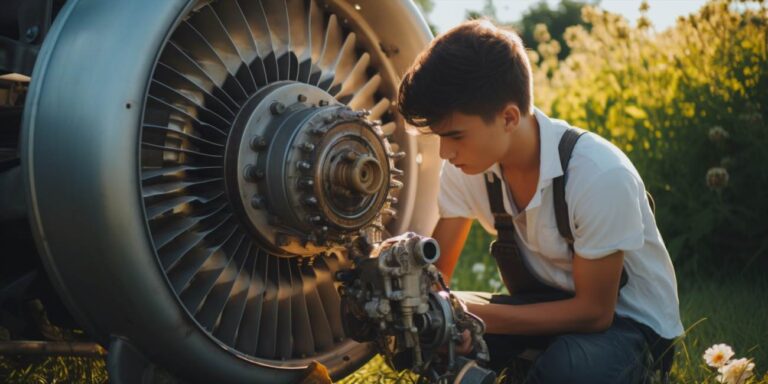Education is your boarding pass to this career. While a high school diploma suffices, pursuing specialized training in aviation maintenance can fast-track your journey. Programs certified by the Federal Aviation Administration (FAA) or other aviation authorities hold the ticket to your future.
Apprenticeships are the cockpit of hands-on experience. Landing one grants you the chance to shadow seasoned technicians, immersing yourself in the nuts and bolts of aircraft maintenance. These programs, often offered by airlines or maintenance repair organizations, provide invaluable insight and, at times, even a job offer upon completion.
Securing an airframe and powerplant (A&P) license is the compass pointing true north in this field. This certification, awarded by the FAA upon passing rigorous exams, validates your expertise in aircraft maintenance and repair.
Networking isn’t just a buzzword; it’s the fuel for progression. Connect with professionals in the aviation industry, attend seminars, join forums, and consider memberships in associations like the Aircraft Maintenance Technicians Association (AMTA). These connections might unveil hidden opportunities and mentorship.
As you soar through your education and training, consider specializing in a niche area. Whether it’s avionics, structures, engines, or even helicopters, honing expertise in a specific field can open doors to higher-paying roles and specialized aircraft maintenance careers.
Remember, soft skills are the wind beneath your wings. Communication, problem-solving, and attention to detail are crucial. Airlines and maintenance organizations seek individuals who not only understand the mechanics but also excel in teamwork and adaptability.
The runway to success in aircraft maintenance is paved with dedication, continuous learning, and a passion for aviation. Embrace each opportunity, learn from setbacks, and let your passion for aviation fuel your journey into this dynamic and rewarding career.
Qualifications and training required to start working in aircraft maintenance
Entering the field of aircraft maintenance requires a combination of qualifications and training to ensure that individuals are well-equipped to handle the intricacies of aircraft systems and components.
The minimum educational requirement for aspiring aircraft maintenance technicians is typically a high school diploma or its equivalent. However, most employers prefer candidates with additional education, such as an aviation maintenance technology program from a certified institution. These programs delve into the fundamentals of aircraft systems, safety procedures, and the use of specialized tools.
Furthermore, individuals looking to pursue a career in aircraft maintenance need to obtain the appropriate certifications. The FAA Airframe and Powerplant (A&P) certification is a crucial credential, demonstrating the technician’s competence in both airframe and powerplant maintenance. To qualify for the A&P certification, candidates must complete a FAA-approved training program or gain a certain amount of hands-on experience working on aircraft.
Hands-on experience is a cornerstone of aircraft maintenance training. Many aspiring technicians opt for apprenticeships or internships with airlines, maintenance repair organizations (MROs), or aviation companies. These opportunities allow individuals to apply theoretical knowledge in real-world scenarios, gaining practical skills under the guidance of experienced mentors.
Additionally, aircraft maintenance technicians must stay up-to-date with the latest advancements in aviation technology. Continuous professional development is crucial, and technicians often attend workshops, seminars, and specialized training courses to enhance their knowledge and skills. This commitment to ongoing learning ensures that technicians remain adept at handling the evolving complexities of modern aircraft.
It’s worth noting that a strong emphasis is placed on safety and regulatory compliance in aircraft maintenance. Technicians need to be well-versed in FAA regulations and adhere to strict safety protocols. Training programs often include modules on safety procedures, emergency response, and compliance with aviation regulations to instill a culture of safety among aspiring technicians.
Finding the right aviation maintenance program that matches your goals and budget
Embarking on a career in aviation maintenance is an exciting journey that requires careful consideration of various factors to ensure it aligns with your goals and budget. Whether you aspire to attain a maintenance technician degree or pursue an aviation mechanic certification, finding the right program is crucial.
One avenue to explore is aviation technical schools, which play a pivotal role in shaping skilled professionals for the aviation industry. These institutions offer specialized programs designed to equip students with the knowledge and hands-on experience required for a successful career as an aviation maintenance technician.
When evaluating different programs, it’s essential to consider your personal goals. If you are aiming for a comprehensive education that covers a broad spectrum of aviation maintenance aspects, a maintenance technician degree might be the ideal choice. These degree programs often provide a more extensive curriculum, including theoretical coursework and practical training.
On the other hand, if you are looking for a more focused and streamlined path to enter the workforce quickly, pursuing an aviation mechanic certification could be the answer. Certification programs tend to be shorter in duration, allowing you to acquire the necessary skills efficiently.
One key factor to keep in mind is the accreditation of the program. An aviation technical school with proper accreditation ensures that the education you receive meets industry standards, enhancing your credibility as a qualified aviation maintenance professional.
Considering budget constraints is another critical aspect of the decision-making process. Some aviation technical schools may offer financial aid or scholarships, making education more accessible. Researching these options and understanding the financial aspects can significantly impact your overall experience.
For those who prefer a more structured comparison, the following table outlines key considerations when choosing between a maintenance technician degree and an aviation mechanic certification:
| Aspect | Maintenance Technician Degree | Aviation Mechanic Certification |
|---|---|---|
| Duration | Longer (typically 2-4 years) | Shorter (varies, often 12-24 months) |
| Curriculum | Comprehensive, covering various aspects of aviation maintenance | Focused on essential skills for immediate entry into the workforce |
| Cost | Higher tuition but potential for advanced career opportunities | Shorter duration may result in lower overall costs |
Ultimately, the decision between a maintenance technician degree and an aviation mechanic certification depends on your career goals, preferred learning style, and financial considerations. Researching and visiting potential schools, speaking with industry professionals, and weighing the pros and cons will help you make an informed choice that sets you on the path to a successful career in aviation maintenance.
Getting experience through apprenticeships and on the job training
Embarking on a journey to become an apprentice aircraft mechanic is a thrilling venture into the heart of aviation. Beyond the classroom, hands-on experience is the key to mastering the intricacies of aircraft maintenance. On-the-job training provides an unparalleled opportunity to immerse oneself in the practical aspects of aircraft mechanics.
One avenue to gain experience is by shadowing aviation technicians. This involves closely observing and learning from seasoned professionals as they navigate the complexities of aircraft maintenance. Through this process, aspiring aircraft mechanics absorb real-world insights that textbooks cannot convey. This immersive learning experience is invaluable for honing skills and building a solid foundation.
Volunteering with aviation organizations is another dynamic approach to garner hands-on experience. These volunteer aviation organizations often provide opportunities to work on diverse projects, from restoring vintage aircraft to participating in community outreach programs. In such environments, aspiring aircraft mechanics can apply their knowledge in practical scenarios, fostering a deeper understanding of the field.
Imagine the scenario of an apprentice standing beside a seasoned aircraft mechanic, wrench in hand, ready to dive into the intricacies of an aircraft engine. The apprentice aircraft mechanic absorbs knowledge like a sponge, learning not only the technicalities of the trade but also the importance of precision and attention to detail.
Similarly, the experience of shadowing aviation technicians allows aspiring mechanics to witness the troubleshooting process firsthand. From diagnosing engine malfunctions to conducting routine inspections, shadowing provides a front-row seat to the challenges and triumphs that define a career in aircraft maintenance.
Volunteering with aviation organizations introduces apprentices to a network of professionals and enthusiasts who share a passion for aviation. Whether assisting in the restoration of a historic aircraft or contributing to aviation education initiatives, volunteers gain exposure to various facets of the industry.
As a part of on-the-job training, apprentice aircraft mechanics often find themselves working in hangars, collaborating with experienced technicians on actual aircraft. This hands-on experience is a crucial component of the learning process, allowing apprentices to apply theoretical knowledge in a practical setting.
The significance of shadowing aviation technicians lies in its role as a bridge between theory and practice. It transforms classroom knowledge into a skill set that is finely tuned to the demands of the aviation industry. Shadowing is not merely observing; it is a dynamic engagement with the challenges of real-world aircraft maintenance.
Volunteer opportunities with aviation organizations not only contribute to personal growth but also provide a platform for building a professional network. This network becomes a valuable resource for knowledge exchange, career advice, and potential job opportunities in the future.
See also:
- Becoming a licensed aircraft mechanic: education, training and certification
- How much do aircraft inspectors make: lucrative aviation careers
- How much do aircraft assemblers make: complete salary and job overview
- Single engine piston aircraft: what you need to know before becoming a pilot
- When is an aircraft annual inspection due: necessary maintenance steps





